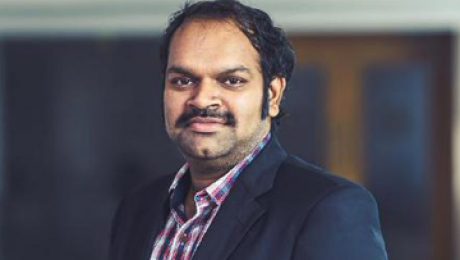Life of an ECE Student at SRM University-AP
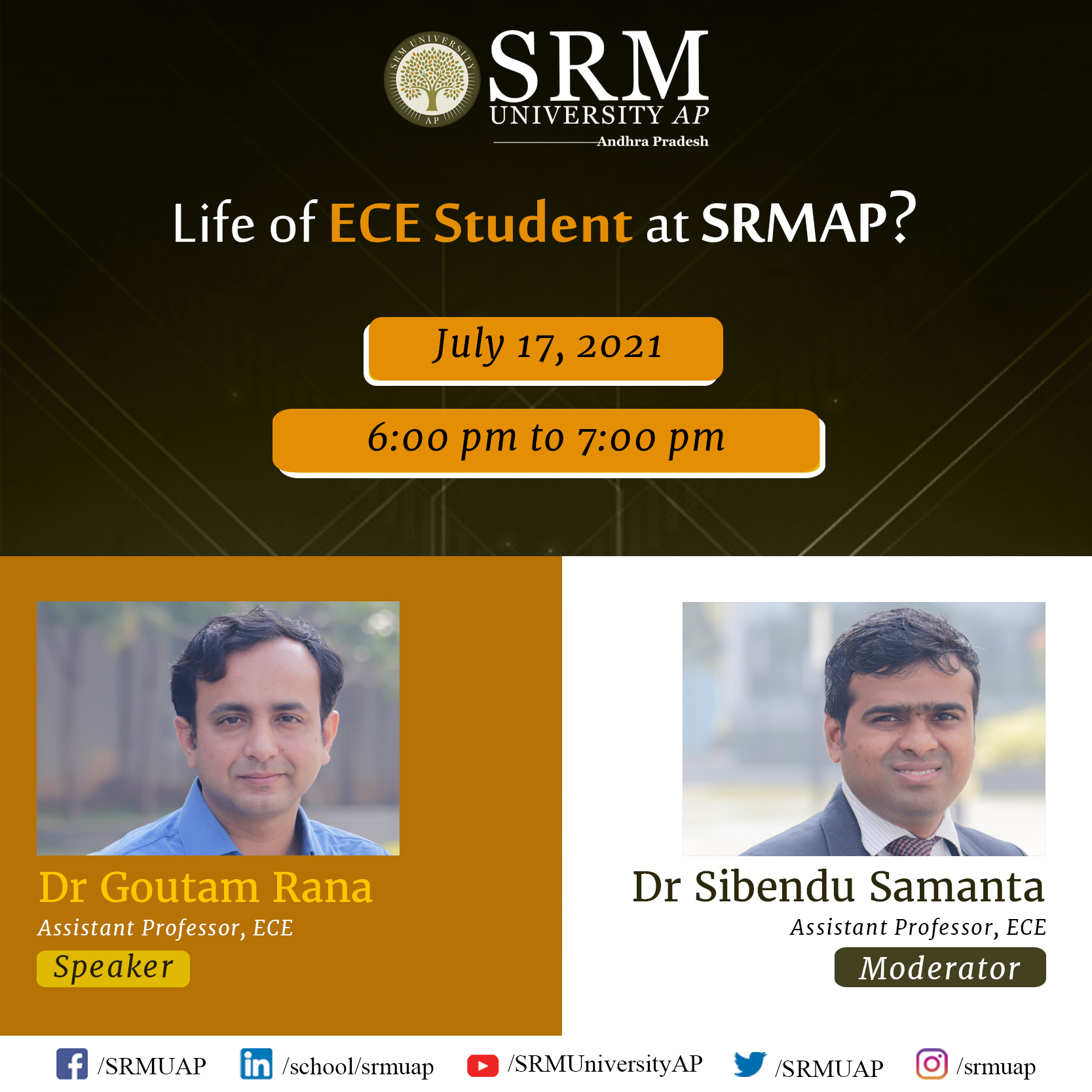 Electronics and Communication Engineering (ECE) at SRM University-AP prepares students to take part in the next-gen industrial revolution (Industry 4.0 and beyond). To inform the aspirants about the activity-based inter & multi-disciplinary learning and the vibrant life of ECE students, the Department of Electronics and Communication Engineering is organising a webinar and panel session on July 17, 2021, at 6.00 pm.
Electronics and Communication Engineering (ECE) at SRM University-AP prepares students to take part in the next-gen industrial revolution (Industry 4.0 and beyond). To inform the aspirants about the activity-based inter & multi-disciplinary learning and the vibrant life of ECE students, the Department of Electronics and Communication Engineering is organising a webinar and panel session on July 17, 2021, at 6.00 pm.
In the session “Clubs with ECE (Microwave+ Linux)” moderated by Assistant professor Dr Sibendu Samanta, Assistant professor Dr Goutam Rana will talk about the specialised clubs for experiential learning that ECE students receive at our university.
Study Abroad Programme (SAP) aimed for students at SRM University- AP let them spend one full semester in one of our collaborating universities (The University of California, University of Wisconsin, Flinders University, IIT Chicago, Efrei Paris, National Tsing Hua University, University of Skovde, North Eastern University, Asia University). The Linux club to ease out learning complex coding in Advance OS and Computer and the Antenna/Microwave component designing club to bridge the gap between RF, Microwave Industry and conceptual theoretical classroom learning are specialities of ECE department.
Join this interactive webinar on July 17, 2021, at 6.00 pm and know how your life as an ECE graduate student at SRM University-AP.
Register here: https://srmap.zoom.us/webinar/register/WN_zM1QE8wAQ72_kM20jX4InA
To know more: https://srmap.edu.in/blog/life-of-an-ece-student/
- Published in Admission Events - Domestic, ECE Events, Events
The Newsmakers: Saptarshi and Rajarshi Mazumder brothers
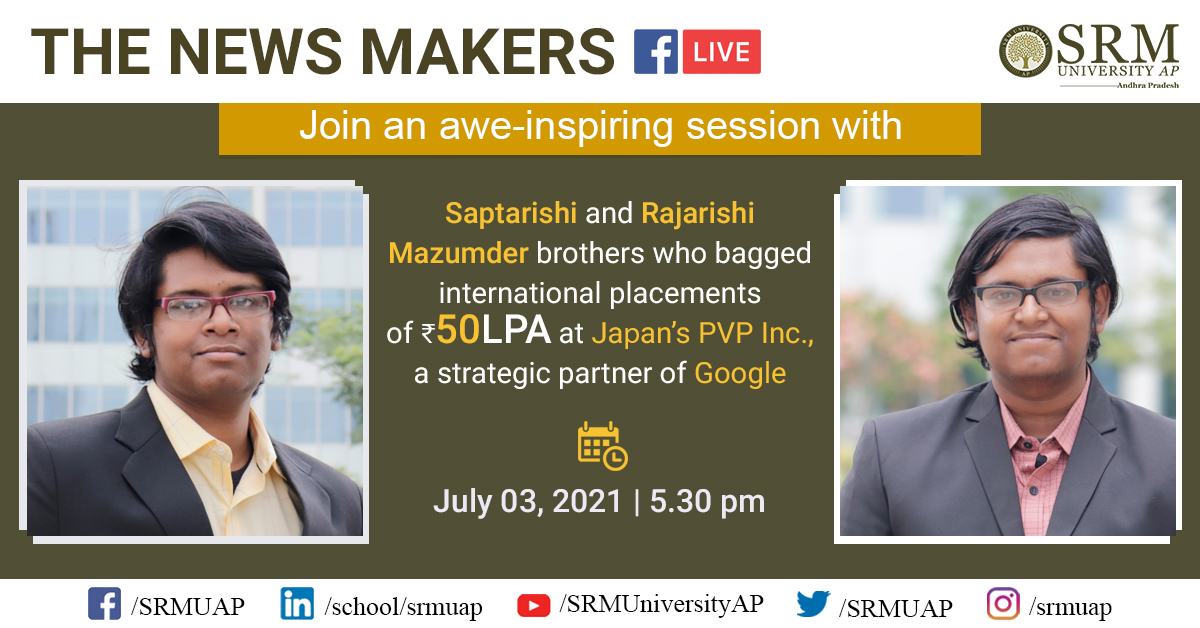 SRM University-AP is extremely proud to announce the accomplishments of the Saptarshi and Rajarshi Mazumder brothers, two magnificent Computer Science Engineering graduates from the Maiden Batch-2017. The duo bagged jobs at Japan’s PVP Inc., a strategic partner of Google Japan, with a whopping 50 LPA salary packages each, making the achievement the highest salary package amongst the 96 per cent of students who secured placements in the campus recruitment drive. The Department of Students’ Affairs has invited Saptarshi and Rajarshi to the upcoming segment of “The Newsmakers” on July 03, 2021, at 5:30 pm., where they will share their journey from SRM University-AP to a top-tier global organisation.
SRM University-AP is extremely proud to announce the accomplishments of the Saptarshi and Rajarshi Mazumder brothers, two magnificent Computer Science Engineering graduates from the Maiden Batch-2017. The duo bagged jobs at Japan’s PVP Inc., a strategic partner of Google Japan, with a whopping 50 LPA salary packages each, making the achievement the highest salary package amongst the 96 per cent of students who secured placements in the campus recruitment drive. The Department of Students’ Affairs has invited Saptarshi and Rajarshi to the upcoming segment of “The Newsmakers” on July 03, 2021, at 5:30 pm., where they will share their journey from SRM University-AP to a top-tier global organisation.
Japan’s PVP Inc. is a strategic partner of Google, which is one of the world’s largest search engine providers. It offers products and services that enable the creation of new businesses. It is the first time that students from a private university in India have received a 50-lakh rupee salary package. Both Saptarshi and Rajarshi, the twin brothers, have set an example by bagging equal salary packages from the same organisation.
To honour the twins Saptarshi and Rajarshi, SRM University-AP has awarded them with a cash prize of 2 lakh rupees. They are among the few to secure exciting positions at one of the top-notch multinational technology companies. To know more about their successful journey to Google, Japan, attend the inspirational virtual session on July 03, 2021, at 5:30 pm.
- Published in CSE EVENTS, Events, Students Affairs Events
Essential coping skills for students
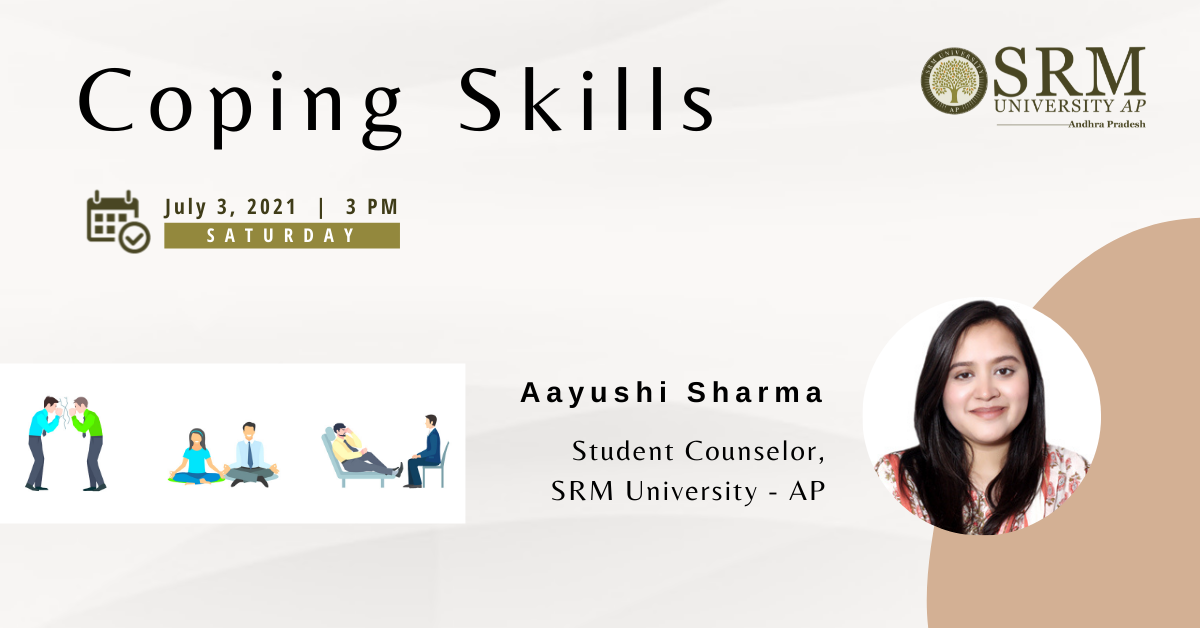 Many young people find it strenuous to deal with unexpected events in their lives. It is vital to be kind to your mental health. Coping skills help an individual to face and overcome stressful circumstances. To educate students on Coping Skills, the Department of Students’ Affairs is initiating a virtual talk on July 03, 2021, at 3.00 pm with Ms Aayushi Sharma, the Student Counsellor of our university.
Many young people find it strenuous to deal with unexpected events in their lives. It is vital to be kind to your mental health. Coping skills help an individual to face and overcome stressful circumstances. To educate students on Coping Skills, the Department of Students’ Affairs is initiating a virtual talk on July 03, 2021, at 3.00 pm with Ms Aayushi Sharma, the Student Counsellor of our university.
Young people, when they face difficulties in their careers, can become easily stressed. In simple terms, coping skills are the ability one needs to handle any situation in life with intelligence and resilience. The coping mechanisms and the capacity to deal with problems vary among individuals. Everyone experiences ups and downs in life, no matter what they are. Some face situations with courage, and others succumb to dangerous steps. Thus, coping skills are essential to deal with this tough, competitive world.
SRM University-AP takes care of the complete development of students which includes their emotional well-being. Therefore, all students are invited to attend the interactive session on July 03, 2021, at 3.00 pm to learn healthy practices for life.
- Published in Events, Students Affairs Events
career paths in the Automotive Industry
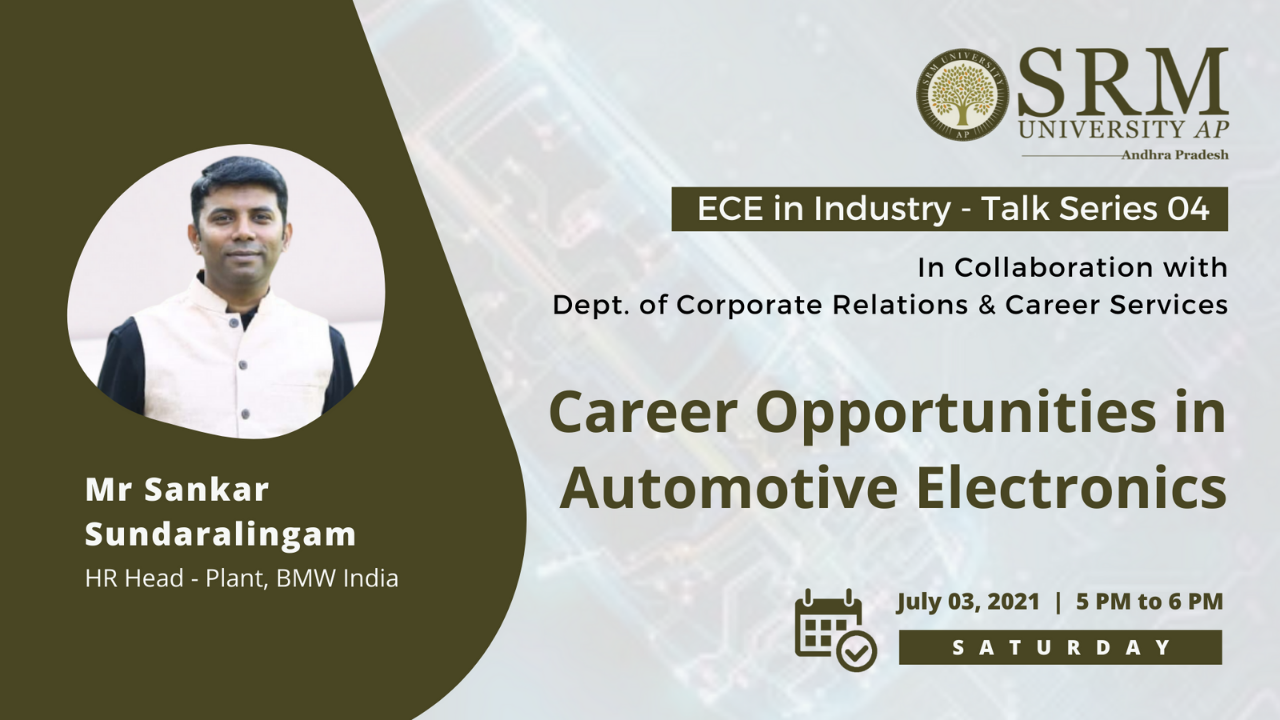 The Department of ECE and Corporate Relations & Career Services are partnering to organise the 4th edition of the talk series-ECE in Industry on July 03, 2021, at 5 pm (Saturday). Mr. Sankar Sundaralingam, Head of HR for the Manufacturing Plant, BMW, India, will speak about “Career Opportunities in Automotive Electronics” and enlighten the students with requirements to pursue their career in automotive industry.
The Department of ECE and Corporate Relations & Career Services are partnering to organise the 4th edition of the talk series-ECE in Industry on July 03, 2021, at 5 pm (Saturday). Mr. Sankar Sundaralingam, Head of HR for the Manufacturing Plant, BMW, India, will speak about “Career Opportunities in Automotive Electronics” and enlighten the students with requirements to pursue their career in automotive industry.
The session aims to cover an overview of the automotive industry, future trends, and areas of interest for electronic engineering students.
Mr. Sundaralingham has over 16+ years of experience in Human Resources in the automobile, manufacturing, Engineering & IT domains. He began his career in September 2004 as an officer of HR at TCL India, a Hong Kong-based MNC, and later took over TCL India’s overall HR operation. Mr. Sundaralingham has handled multiple unions, international workers, and green field projects.
In June 2012, he moved to TATA Johnson Controls (Group of TATA Auto Components) as the Sr. Manager of HR for the Chennai Facility. From 2015 – 2020, he was associated with BSH (Bosch & Siemens Home Appliances) as General Manager Human Resource Business Partner, Handling Talent Management, Employee Relations, Talent Acquisition, Learning & Development for regional technology India.
Mr. Sundaralingham has a bachelor’s in law, a Master’s in Labour Management from the University of Madras and a PGCHRM from XLRI, Jamshedpur.
The World HRD Congress presented Mr. Sundaralingham with the Super Achiever-HR award. He is an avid storyteller and a writer.
Mr. Sundaralingham is a member of the HR Forums. He is treasurer of Chroma (Centre for Human Resource officers & Managers Affinity), member of NIPM, Chennai Chapter & Co-founder and trustee of the Ooruni Foundation.
Join the session on July 3, 2021, at 5 p.m. (Saturday) for an informative lecture about career opportunities in the automotive industry.
- Published in ECE Events, Events
Biochar for environmental sustainability in the energy-water-agroecosystem nexus.
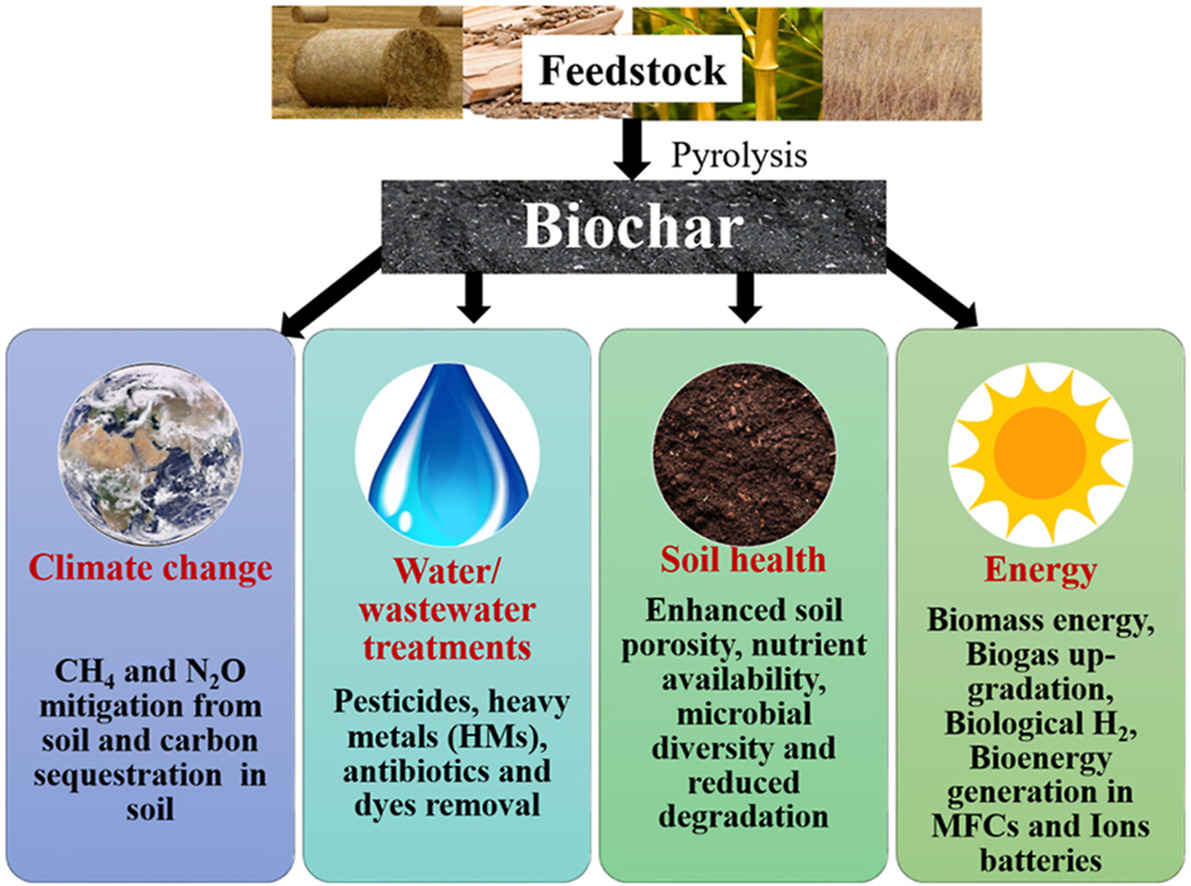 Biochar has an enormous potential in addressing global issues and can act as a catalyst in achieving sustainable development goals (SDGs). Dr Lakhveer Singh, Assistant professor in the Department of Environmental Science, SRM University-AP has co-authored and published a paper on the title “Biochar for environmental sustainability in the energy-water-agroecosystem nexus” in the research journal “Renewable and Sustainable Energy Reviews” with an Impact factor of 14.98.
Biochar has an enormous potential in addressing global issues and can act as a catalyst in achieving sustainable development goals (SDGs). Dr Lakhveer Singh, Assistant professor in the Department of Environmental Science, SRM University-AP has co-authored and published a paper on the title “Biochar for environmental sustainability in the energy-water-agroecosystem nexus” in the research journal “Renewable and Sustainable Energy Reviews” with an Impact factor of 14.98.
Global warming, management of soil health, remediation of contaminated wastewater, and sustainable alternate source of energy are the major challenges of the 21st century. Biochar produced from waste biomass (crop residues, algal biomass, municipal waste, etc.) has dual advantages of waste management along with its application in different sectors. Biochar addition to soil improves soil health, porosity and aeration which mitigates greenhouse gas emission from soil.
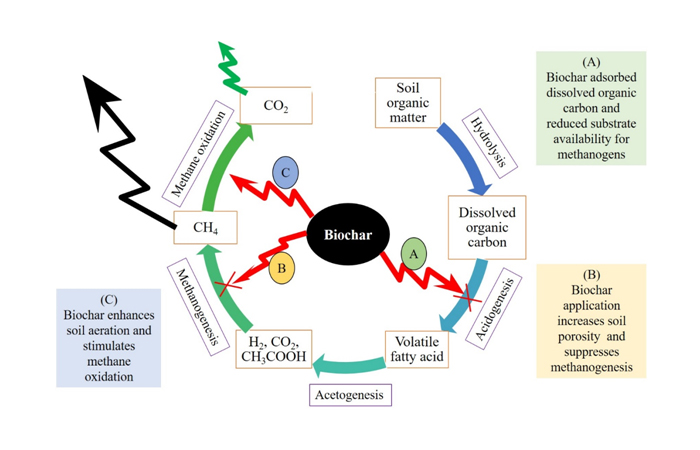 In this manuscript, Dr Lakhveer Singh discusses the potential of biochar for bioenergy production (biogas and biological hydrogen production), greenhouse gases mitigation, carbon sequestration in soils, and wastewater remediation are discussed in detail along with the challenges and future prospects of biochar. This work has been executed in collaborations with the National Institute of Hydrology, Jal Vigyan Bhawan, Roorkee; J.C. Bose University of Science and Technology; YMCA, Faridabad; and IIT Delhi.
In this manuscript, Dr Lakhveer Singh discusses the potential of biochar for bioenergy production (biogas and biological hydrogen production), greenhouse gases mitigation, carbon sequestration in soils, and wastewater remediation are discussed in detail along with the challenges and future prospects of biochar. This work has been executed in collaborations with the National Institute of Hydrology, Jal Vigyan Bhawan, Roorkee; J.C. Bose University of Science and Technology; YMCA, Faridabad; and IIT Delhi.
Dr Singh is an Editorial Board member of the Journal of Biomass Conversion and Biorefinery – Springer (I.F. 2.60) and a Guest Editor for Bioresource Technology Reports- Elsevier.
Read the full paper here: https://www.sciencedirect.com/science/article/abs/pii/S136403212100664X
- Published in Departmental News, ENVS News, News, Research News
Workshop Series-II on Technical Writing with LaTeX
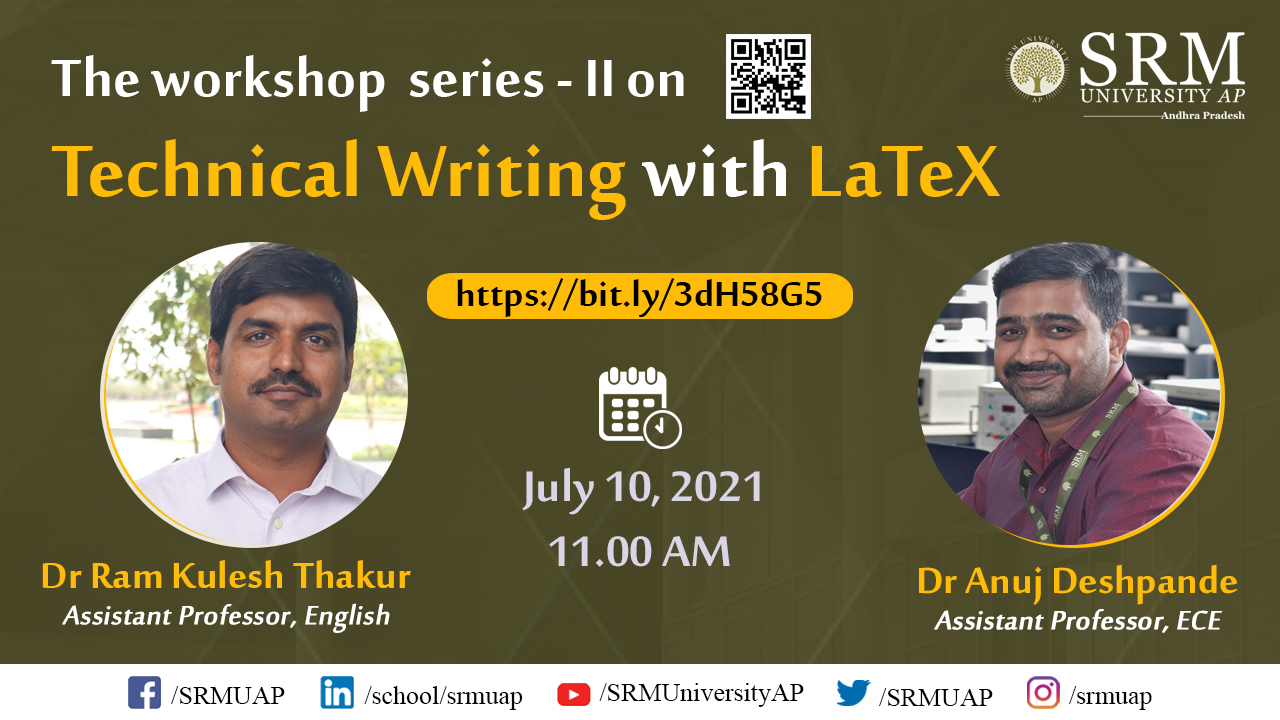 The Department of Electronics and Communication Engineering (ECE) at SRM University-AP is hosting the second edition of the ongoing online Workshop Series “Learn & Earn: Hands-On Science & Technology (HOST)” to learn and explore the latest techniques in the field of science and technology. The workshop series-II titled “Technical Writing with LaTeX” will be held on July 10, 2021, at 11.00 am. Dr Ram Kulesh Thakur, Assistant Professor in the Department of English and Dr Anuj Deshpande, Assistant Professor in the Department of ECE at SRM University-AP, will engage the attendees of the workshop.
The Department of Electronics and Communication Engineering (ECE) at SRM University-AP is hosting the second edition of the ongoing online Workshop Series “Learn & Earn: Hands-On Science & Technology (HOST)” to learn and explore the latest techniques in the field of science and technology. The workshop series-II titled “Technical Writing with LaTeX” will be held on July 10, 2021, at 11.00 am. Dr Ram Kulesh Thakur, Assistant Professor in the Department of English and Dr Anuj Deshpande, Assistant Professor in the Department of ECE at SRM University-AP, will engage the attendees of the workshop.
Dr Ram Kulesh Thakur will discuss how to prepare a technical report and improve writing abilities for research and publishing. Dr Anuj will lead the hands-on technical session on using LaTeX to create technical reports, theses, research papers, and presentations.
Methods to find reliable sources, practical ideas for organising and drafting the paper, transitioning between information, referencing sources and paraphrasing texts to avoid plagiarism, and format for writing abstracts are some of the other topics which will be covered in this session. The goal is to apply research writing abilities in a practical setting, as well as to solve problems and resolve the concerns of the participants.
Join the workshop on July 10, 2021, at 11.00 am to gain proven technical knowledge and hands-on experience on LaTex software. The registration for this workshop is free for all the interested candidates and you are encouraged to register on: https://srmap.zoom.us/webinar/register/WN_kUUZ4M-JSPaNLEAgTw-JPg
About the Speakers:
Dr Ram Kulesh Thakur’s main areas of interest are Indian Writing in English, especially poetry; and English Language Teaching for science and technology. He obtained his doctorate in 2013 from the Indian Institute of Technology (Indian School of Mines) Dhanbad, India, and holds an M Phil (English) from the same institute. Now Assistant Professor at SRM University AP- Andhra Pradesh (India), Dr Thakur has been actively involved in curriculum development, in guiding and training both UG and PG students in enhancing their overall personality to meet the expectations of future employers, i.e., making them corporate ready.
Dr Anuj Deshpande, who has taken Masters from SRTMU, Nanded and a PhD from IIT, Kharagpur is associated with the Department of Electronics and Communication Engineering. Dr Anuj had been one of the Latex experts at the Department of Electronics & Electrical Communication Engineering at Indian Institute of Technology Kharagpur while doing his PhD. His current project is fault analysis and therapeutic intervention in genetic regulatory networks and he has published papers in reputed journals. Dr Anuj has more than ten years of LaTeX experience in training undergraduate and postgraduate students.
- Published in Departmental Events, ECE Events, Events, Workshop
IdeaMIC rewards young innovators with novel ideas
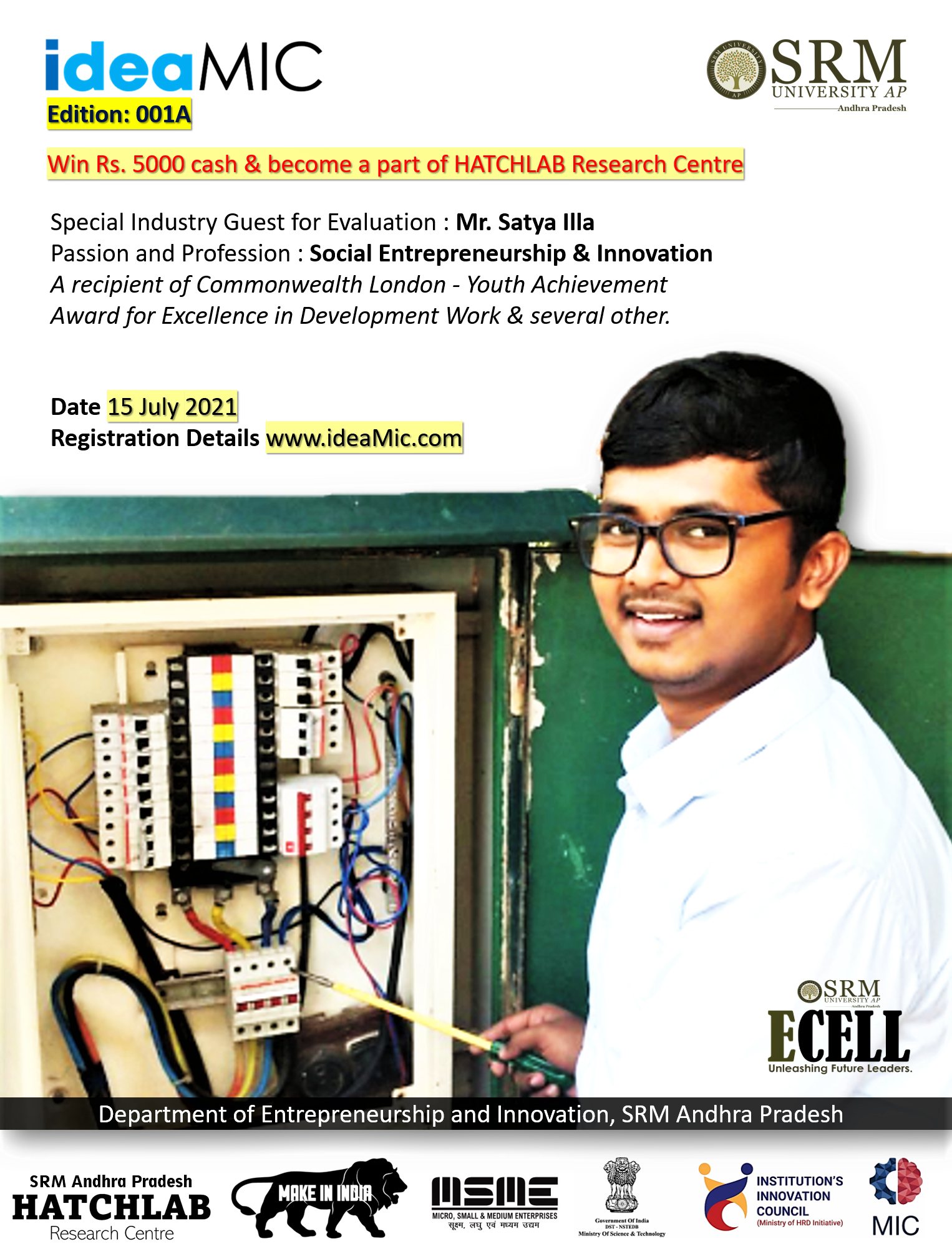 IdeaMIC is a platform to express innovative ideas of entrepreneurship and leadership. The 001A edition of IdeaMIC by the Department of Entrepreneurship and Innovation at SRM University-AP, Andhra Pradesh organises a webinar which will be held on July 15, 2021, at 6.00 pm. The technological innovator and recipient of the Commonwealth London-Youth Achievement Award for Excellence Mr Satya Illa will be the industry evaluator for the month.
IdeaMIC is a platform to express innovative ideas of entrepreneurship and leadership. The 001A edition of IdeaMIC by the Department of Entrepreneurship and Innovation at SRM University-AP, Andhra Pradesh organises a webinar which will be held on July 15, 2021, at 6.00 pm. The technological innovator and recipient of the Commonwealth London-Youth Achievement Award for Excellence Mr Satya Illa will be the industry evaluator for the month.
Mr Satya Illa is the innovative brain behind the shockproof three-phase electrical motor pump that prevents electric shock from motor starters. He had worked with the Institute of Electrical and Electronics Engineers (IEEE) and had been involved in a project incubated by the Bala Vikasa International Centre, Hyderabad. He identifies lack of awareness and poor maintenance of electric devices as the causes for fatalities due to electrocution among farmers.
Every month top 10 ideas are allowed to be presented through IdeaMIC at SRM University-AP. The best idea is given an opportunity to enroll with Hatchlab Research Centre– a TBI of SRM University-AP and the innovator can avail of all the benefits and support from the university. The best and novel idea of the month also gets a reward of Rs. 5000 towards developing the prototype or implementation of the idea.
Leaders from the student council of SRM Ecell, the President of SRM Ecell, senior faculty members, domain experts, and one special guest from the industry will be available in the panel for screening and evaluating the ideas. Once the pandemic is over and the university starts the classes in their full capacities, apart from the live interactions and suggestions, there would be on-campus learning sessions for young innovators across the state.
Join the latest edition of IdeaMIC and pitch in your ideas on July 15, 2021, at 6.00 pm.
Register here for the webinar: https://srmap.zoom.us/meeting/register/tJwpdOyqqzkrHtNnWh6-084RUvZPkV9Zhyai
To Register on IdeaMIC: http://www.ideaMic.com
- Published in Events, IDEA Events
The Newsmaker: Ms Sreelekha Bhuvaneswari
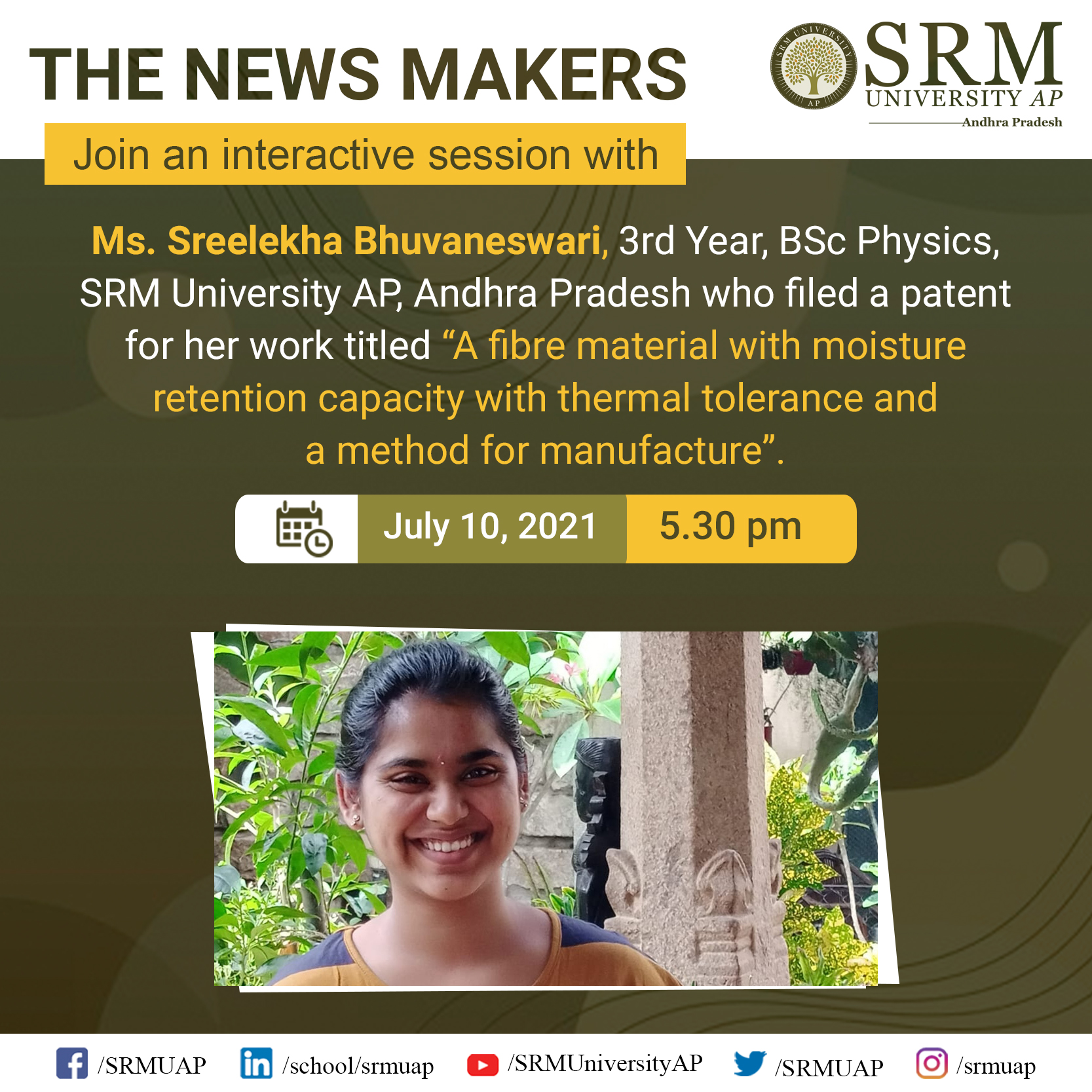 The Department of Students’ Affairs at SRM University-AP, Andhra Pradesh is all set to feature the brilliant Ms Sreelekha Bhuvaneswari in the upcoming segment of “The Newsmakers” scheduled on July 10, 2021, at 5.30 pm. Ms Sreelekha is a BSc physics final year student who brought laurel to the university by filing a patent for her work titled “A fibre material with moisture retention capacity with thermal tolerance and a method for manufacture” under the guidance of Dr Sabyasachi Mukhopadhyay, Assistant Professor in the Department of Physics, SRM University-AP.
The Department of Students’ Affairs at SRM University-AP, Andhra Pradesh is all set to feature the brilliant Ms Sreelekha Bhuvaneswari in the upcoming segment of “The Newsmakers” scheduled on July 10, 2021, at 5.30 pm. Ms Sreelekha is a BSc physics final year student who brought laurel to the university by filing a patent for her work titled “A fibre material with moisture retention capacity with thermal tolerance and a method for manufacture” under the guidance of Dr Sabyasachi Mukhopadhyay, Assistant Professor in the Department of Physics, SRM University-AP.
The project, with the patent application number 202141023375, develops a methodology to design a fabric cloth that would replace the use of air conditioners. This cloth design is inspired by Saharan silver ants which regulate their body temperatures in the scorching desert heat and also from the cooling properties of clay. This research would significantly scale down the usage of AC and other cooling devices in warm places, thus reducing the use of electricity and emission of greenhouse gases to the environment. As this cloth would be environment friendly with long durability and cost-efficiency, Sreelekha hopes that this research would bridge the socioeconomic divide of haves and have-nots between communities.
“The Newsmakers” session on July 10, 2021, at 5.30 pm will feature Ms Sreelekha narrate her inspiring journey which started with the incredible experience at SRM University-AP that eventually enabled her to be an inventor at a young age.
To join the session:
https://srmap.zoom.us/j/91527307888?pwd=ZkhSVTZuOUJSSHg4b0E1bG5iSGlOQT09
- Published in Events, Students Affairs Events
An alternative fiscal stimulus package to Atmanirbhar Bharat
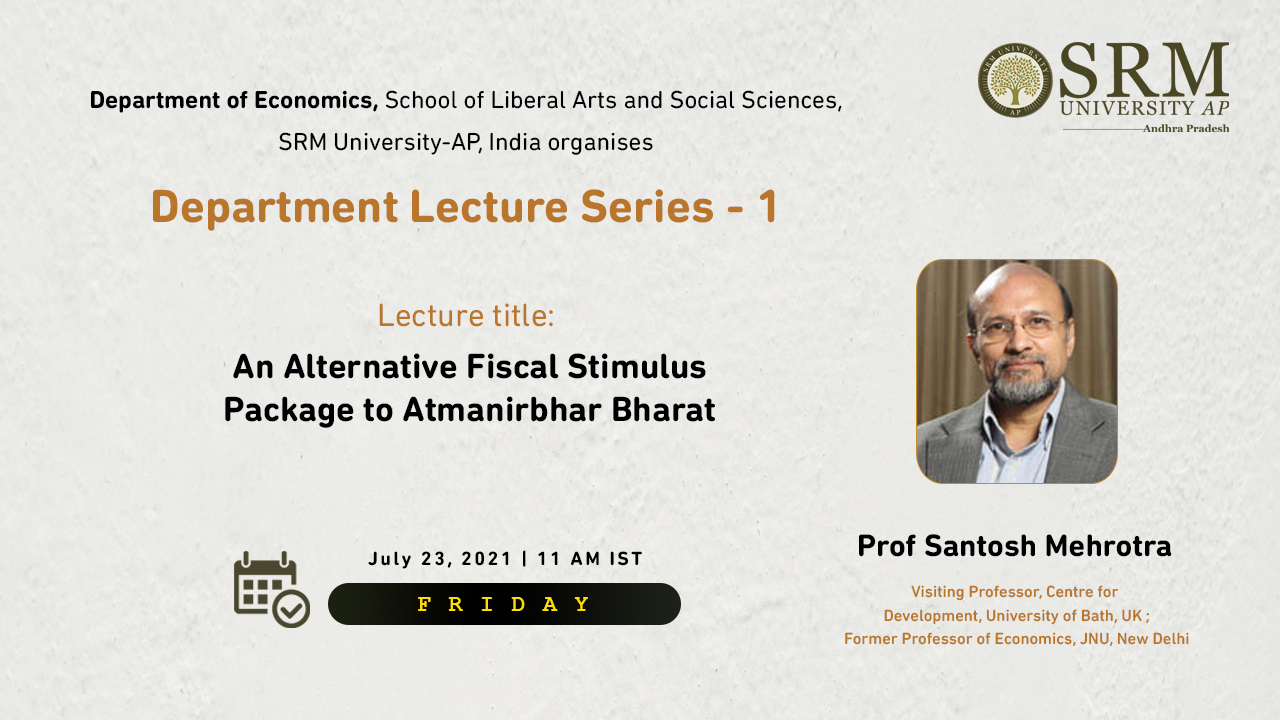 When the fiscal measures announced by the Central Government remain as textbook prescriptions, the scholars of our nation work for bettering the ground reality of India. The Department of Economics at SRM University-AP, in the first session of the Departmental Lecture Series, is conducting an online lecture titled “An Alternative Fiscal Stimulus Package to Atmanirbhar Bharat” on July 23, 2021, at 11.00 am to enunciate a novel perspective for fiscal stimulus packages.
When the fiscal measures announced by the Central Government remain as textbook prescriptions, the scholars of our nation work for bettering the ground reality of India. The Department of Economics at SRM University-AP, in the first session of the Departmental Lecture Series, is conducting an online lecture titled “An Alternative Fiscal Stimulus Package to Atmanirbhar Bharat” on July 23, 2021, at 11.00 am to enunciate a novel perspective for fiscal stimulus packages.
The guest speaker Prof Santosh Mehrotra, visiting professor in the Centre for Development at the University of Bath (UK) will put forth his vision of an alternative fiscal stimulus package to the Atmanirbhar Bharat Abhiyan financial package. Prof Mehrotra had also been a professor of economics at Jawaharlal Nehru University (JNU) Delhi. Dr Ghanshyam Pandey, Assistant Professor and faculty coordinator at the Department of Economics, SRM University-AP is the convenor of the event. The organising committee from the department consists of assistant professors Dr Anandrao Suvvari, Dr Manzoor Hassan Malik, and Dr Balaga Mohana Rao.
The lecture will give a detailed analysis of the Atmanirbhar Bharat initiative and evaluate whether the plans of the policymakers to combat the economic crisis in India acquired the envisioned goals. Join this engaging online lecture on the zoom platform on July 23, 2021, at 11.00 am.
Register now!
To register: https://srmap.zoom.us/webinar/register/WN_BQgOmeRfSryQgn-tq8EDiw
- Published in Departmental Events, Economics Events, Events


